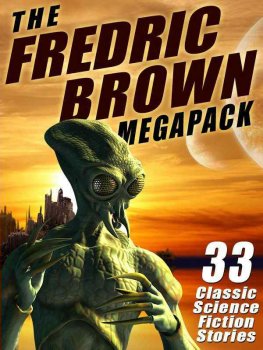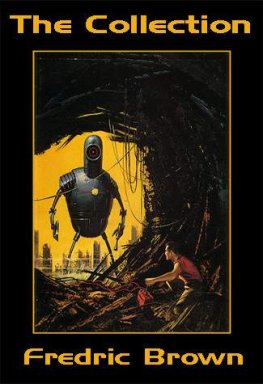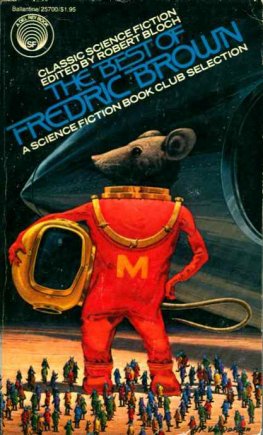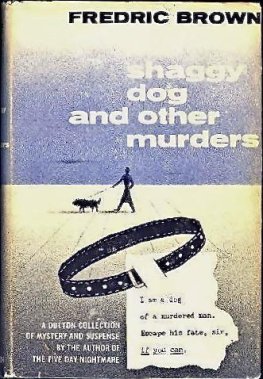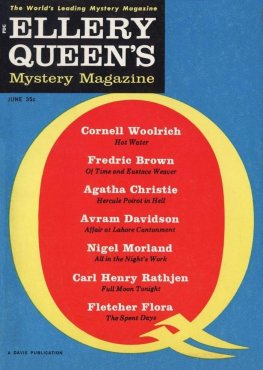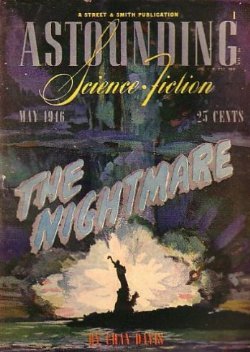Fredric Brown - Pi in the Sky
Here you can read online Fredric Brown - Pi in the Sky full text of the book (entire story) in english for free. Download pdf and epub, get meaning, cover and reviews about this ebook. year: 1945, genre: Science fiction. Description of the work, (preface) as well as reviews are available. Best literature library LitArk.com created for fans of good reading and offers a wide selection of genres:
Romance novel
Science fiction
Adventure
Detective
Science
History
Home and family
Prose
Art
Politics
Computer
Non-fiction
Religion
Business
Children
Humor
Choose a favorite category and find really read worthwhile books. Enjoy immersion in the world of imagination, feel the emotions of the characters or learn something new for yourself, make an fascinating discovery.

- Book:Pi in the Sky
- Author:
- Genre:
- Year:1945
- Rating:3 / 5
- Favourites:Add to favourites
- Your mark:
- 60
- 1
- 2
- 3
- 4
- 5
Pi in the Sky: summary, description and annotation
We offer to read an annotation, description, summary or preface (depends on what the author of the book "Pi in the Sky" wrote himself). If you haven't found the necessary information about the book — write in the comments, we will try to find it.
Pi in the Sky — read online for free the complete book (whole text) full work
Below is the text of the book, divided by pages. System saving the place of the last page read, allows you to conveniently read the book "Pi in the Sky" online for free, without having to search again every time where you left off. Put a bookmark, and you can go to the page where you finished reading at any time.
Font size:
Interval:
Bookmark:
Pi in the Sky
by Fredric Brown
I
Roger Jerome Phlutter, for whose absurd surname I offer no defense other than it is genuine, was, at the time of the events of this story, a hard-working clerk in the office of the Cole Observatory.
He was a young man of no particular brilliance, although he performed his daily tasks assiduously and efficiently, studied the calculus at home for one hour every evening, and hoped some day to become a chief astronomer of some important observatory.
Nevertheless, our narration of the events of late March in the year 1999 must begin with Roger Phlutter for the good and sufficient reason that he, of all men on earth, was the first observer of the stellar aberration.
Meet Roger Phlutter.
Tall, rather pale from spending too much time indoors, thickish, shell-rimmed glasses, dark hair close-cropped in the style of the nineteen nineties, dressed neither particularly well nor badly, smokes cigarettes rather excessively
At a quarter to five that afternoon, Roger was engaged in two simultaneous operations. One was examining, in a blink-microscope, a photographic plate taken late the previous night of a section in Gemini. The other was considering whether or not, on the three dollars remaining of his pay from last week, he dared phone Elsie and ask her to go somewhere with him.
Every normal young man has undoubtedly, at some time or other, shared with Roger Phlutter his second occupation, but not everyone has operated or understands the operation of a blink-microscope. So let us raise our eyes from Elsie to Gemini.
A blink-mike provides accommodation for two photographic plates taken of the same section of sky hut at different times. These plates are carefully juxtaposed and the operator may alternately focus his vision, through the eyepiece, first upon one and then upon the other, by means of a shutter. If the plates arc identical, the operation of the shutter reveals nothing, but if one of the dots on the second plate differs from the position it occupied on the first, it will call attention to itself by seeming to jump back and forth as the shutter is manipulated.
Roger manipulated the shutter, and one of the dots jumped. So did Roger. He tried it again, forgettingas we haveall about Elsie for the moment, and the dot jumped again. It jumped almost a tenth of a second. Roger straightened up and scratched his head. He lighted a cigarette, put it down on the ash tray, and looked into the blink-mike again. The dot jumped again when he used the shutter.
Harry Wesson, who worked the evening shift, had just come into the office and was hanging up his topcoat. Hey, Harry! Roger said. Theres something wrong with this blinking blinker.
Yeah? said I Harry.
Yeah. Pollux moved a tenth of a second.
Yeah? said harry. Well, thats about right for parallax. Thirty-two light yearsparallax of Pollux is point one o one. Little over a tenth of a second, so if your comparison plate was taken about six months ago, when the earth was on the other side of her orbit, thats about right.
But, Harry, the comparison plate was taken night before last. Theyre twenty-four hours apart.
Youre crazy.
Look for yourself.
It wasnt quite five oclock yet, but Harry Wesson magnanimously overlooked that and sat down in front of the blink-mike. He manipulated the shutter, and Pollux obligingly jumped.
There wasnt any doubt about its being Pollux, for it was far and away the brightest dot on the plate. Pollux is a star of 1.2 magnitude, one of the twelve brightest in the sky and by far the brightest in Gemini. And none of the faint stars around it had moved at all.
Um, said Harry Wesson. He frowned and looked again. One of those plates is misdated, thats all. Ill check into it first thing.
Those plates arent misdated, Roger said doggedly. I dated them myself.
That proves it, Harry told him. Go on home. Its five oclock. If Pollux moved a tenth of a second last night, Ill move it back for you.
So Roger left.
He felt uneasy somehow, as though he shouldnt have. He couldnt put his finger on just what worried him, but something did. He decided to walk home instead of taking the bus.
Pollux was a fixed star. It couldnt have moved a tenth of a second in twenty-four hours.
Lets seethirty-two light years. Roger said to himself. Tenth of a second. Why, that would be movement several times faster than the speed of light. Which is positively silly!
Wasnt it?
He didnt feel much like studying or reading tonight. Was three dollars enough to take out Elsie?
The three balls of a pawnshop loomed ahead, and Roger succumbed to temptation. He pawned his watch and then phoned Elsie. Dinner and a show?
Why certainly, Roger.
So until he took her home at one-thirty, he managed to forget astronomy. Nothing odd about that. It would have been strange if he had managed to remember it.
But his feeling of restlessness came back as soon as he left her. At first, he didnt remember why. He knew merely that he didnt feel quite like going home yet.
The corner tavern was still open, and he dropped in for a drink. He was having his second one when he remembered. He ordered a third.
Hank, he said to the bartender. You know Pollux?
Pollux who? asked Hank.
Skip it, said Roger. He had another drink and thought it over. Yes, hed made a mistake somewhere. Pollux couldnt have moved.
He went outside and started to walk home. He was almost there when it occurred to him look up at Pollux. Not that, with the naked eye, he could detect a displacement of a tenth of a second, but he felt curious.
He looked up, allocated himself by the sickle of Leo, and then found GeminiCastor and Pollux were the only stars in Gemini visible, for it wasnt a particularly good night for seeing. They were there, all right, but he thought they looked a little farther apart than usual. Absurd, because that would be a matter of degrees, not minutes or seconds.
He stared at them for a while and then looked across at the Dipper. Then he stopped walking and stood there. He closed his eyes and opened them again, carefully.
The Dipper just didnt look right. It was distorted. There seemed to be more space between Alioth and Mizar, in the handle than between Mizar and Alkaid. Phecda and Merak, in the bottom of the Dipper, were closer together, making the angle between the bottom and the lip steeper. Quite a bit steeper.
Unbelievingly, he ran an imaginary line from the pointers, Merak and Dubhe, to the North Star. The line curved. It had to. If he ran it straight, it missed Polaris by maybe five degrees.
Breathing a bit hard, Roger took off his glasses and polished them very carefully with his handkerchief. He put them back on again, and the Dipper was still crooked. So was Leo when he looked back to it. At any rate, Regulus wasnt where it should be by a degree or two. A degree or two! At the distance of Regulus. Was it sixty-five light years? Something like that.
Then, in time to save his sanity, Roger remembered that hed been drinking. He went home without daring to look upward again. He went to bed but he couldnt sleep.
He didnt feel drunk. He grew more excited, wide awake.
Roger wondered if he dared phone the observatory. Would he sound drunk over the phone? The devil with whether he sounded drunk or not, he finally decided. He went to the telephone in his pajamas.
Sorry, said the operator.
What dya mean, sorry?
I cannot give you that number, said the operator in dulcet tones. And then, I am sorry. We do not have that information.
He got the chief operator and the information. Cole Observatory had been so deluged with calls from amateur astronomers that they had found it necessary to request the telephone company to discontinue all incoming calls save long distance ones from other observatories.
Font size:
Interval:
Bookmark:
Similar books «Pi in the Sky»
Look at similar books to Pi in the Sky. We have selected literature similar in name and meaning in the hope of providing readers with more options to find new, interesting, not yet read works.
Discussion, reviews of the book Pi in the Sky and just readers' own opinions. Leave your comments, write what you think about the work, its meaning or the main characters. Specify what exactly you liked and what you didn't like, and why you think so.

